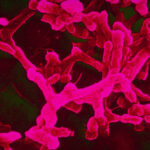New Antibiotic Discovered Up Your Nose
While concerns continue to build around the increase in drug-resistant germs, and researchers look for alternatives to antibiotics, one team has isolated a bacterium inside the human nose that works as an antibiotic against Staph infections.
Biologists have discovered that a bacterium found in the human nose can produce antibiotics to destroy Staphyloccus aureus (Staph), a bacterium that causes many conditions including Toxic Shock Syndrom, skin infections and food poisoning. The researchers behind the Nature study found that the antibiotic, which they named Lugdunin, is so powerful it can even kill antibiotic resistant strains of Staph (MRSA).
The researchers tested the Lugdunin antibiotic as a topical agent on mice with a Staph skin infection and found that it treated all forms of the infection effectively. “This is of great importance as, to date, no bacteria from the human body has been able to produce such compounds,” says Bernhard Krismer, one of the study’s lead authors. Most antibiotics that are currently in use are produced by soil-living bacteria or fungi.
The study examined nasal swabs from 187 hospitalized patients and discovered that 30 percent of these patients carried the Staphylococcus aureus bacterium, while the antibiotic-producing bacterium Staphylococcus lugdunensis was found in 9 percent of the swabs. Patients who carried the lugdunensis bacterium were much less likely to have a Staph colonization in their noses– in fact, only 5.9 percent had Staph, in comparison to 34.7 percent of those without the lugdunensis bacterium. By identifying the significance of the lugdunensis bacterium, the study narrowed down a correlation between certain nasal bacteria and the presence of Staph that scientists have long been aware of.
The researchers say that the results are a step forward in the efforts to avoid the rise of antibiotic-resistant “super-bugs,” such as MRSA. However, while research into new forms of antibiotics is essential. Krismer says there’s more work to be done in other areas: “It is very important to reduce the amount of prescribed antibiotics, to sparingly use last resort antibiotics, and to dramatically reduce the amount of antibiotics in animal breeding.”
A version of this story originally appeared on ResearchGate.
Image credit Wikipedia.




